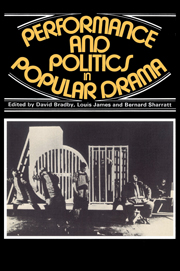 Performance and Politics in Popular Drama
Performance and Politics in Popular Drama Book contents
- Frontmatter
- Contents
- List of contributors
- Preface
- Acknowledgements
- PART ONE Spectacle, performance and audience in nineteenth-century theatre
- Introduction
- Was Jerrold's Black Ey'd Susan more popular than Wordsworth's Lucy?
- Word and image in Pixérécourt's melodramas: the dramaturgy of the strip-cartoon
- Joseph Bouchardy: a melodramatist and his public
- The music of melodrama
- Popular theatre in Victorian Birmingham
- Water drama
- Equestrian drama and the circus
- Theatre of war: the Crimea on the London stage 1854–5
- Popular drama and the mummers' play
- PART TWO Politics and performance in twentieth-century drama and film
- PART THREE Problems and prospects
- Appendix: Tempo, Tempo
- Select bibliography
- General index
- Index of titles of plays, films, sketches
- Index of theatres, theatre companies and groups
The music of melodrama
Published online by Cambridge University Press: 08 March 2010
- Frontmatter
- Contents
- List of contributors
- Preface
- Acknowledgements
- PART ONE Spectacle, performance and audience in nineteenth-century theatre
- Introduction
- Was Jerrold's Black Ey'd Susan more popular than Wordsworth's Lucy?
- Word and image in Pixérécourt's melodramas: the dramaturgy of the strip-cartoon
- Joseph Bouchardy: a melodramatist and his public
- The music of melodrama
- Popular theatre in Victorian Birmingham
- Water drama
- Equestrian drama and the circus
- Theatre of war: the Crimea on the London stage 1854–5
- Popular drama and the mummers' play
- PART TWO Politics and performance in twentieth-century drama and film
- PART THREE Problems and prospects
- Appendix: Tempo, Tempo
- Select bibliography
- General index
- Index of titles of plays, films, sketches
- Index of theatres, theatre companies and groups
Summary
The purpose of this paper is to demonstrate and reinforce observations I have made on earlier occasions: that nineteenth-century popular entertainment continues and elaborates the eighteenth-century practice of combining in various forms drama and music, and further, that when, on the continent and thereafter in England, Ibsen, Henry Arthur Jones, Pinero, Wilde, Granville-Barker, to name but a few pioneering playwrights, introduced the so-called New Drama, one of the sharpest breaks they made with established theatrical custom was to end the practice of accompanying dramatic action with music. Serious drama, call it melodrama or tragedy, was suddenly musicfree. Hedda Gabler's short bursts of piano-playing and subsequent suicide, Paula Tanqueray's death, the Reverend Michael Feversham's admissions of sin and hypocrisy happen against offstage silence, not above and in addition to the woodwinds, strings, and brasses of a thirty-piece pit-orchestra. We in the twentieth century have inherited a comparatively new practice, not a long-established tradition, and, mistakenly, we have taken the older tradition to be some peculiar manifestation of the Victorian stage. I am increasingly convinced that our failure to take into account the extent to which drama was staged, and staged by choice, with full orchestral accompaniment derives from a misreading of testimony given before committees of Parliament and statements in the press by partisans of minor theatres who, before the Licensing Act of 1843, were attempting to curtail the monopoly of the patent houses and who fastened on the obligation under the ‘burletta’ licence to provide music as a point to press their attack.
- Type
- Chapter
- Information
- Performance and Politics in Popular DramaAspects of Popular Entertainment in Theatre, Film and Television, 1800–1976, pp. 49 - 64Publisher: Cambridge University PressPrint publication year: 1980
- 7
- Cited by


